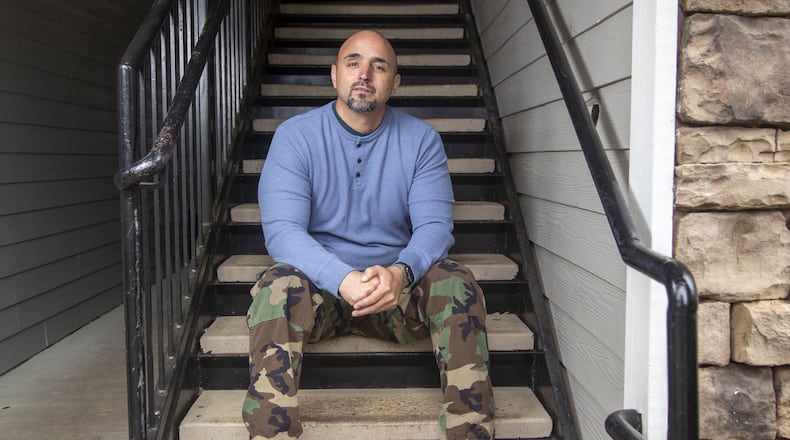“Forgiveness means giving up all hope for a better past,” says Alex Alvarado, quoting writer and comedian Lily Tomlin.
A 46-years-old, Alvarado has been to jail a handful of times. He’s a convicted felon, having charges of grand theft auto and several drug accounts. Living life as a former inmate has presented a series of setbacks finding work and resources, which has only increased during the COVID-19 pandemic.
Through organizations like the Greater Gwinnett Reentry Alliance (GGRA), which provides supplies and services to former inmates, and NSPIRE Outreach Atlanta, a nonprofit committed to rehabilitating those dealing with homelessness, addiction, domestic violence, abuse, neglect and more, Alvarado has been able to take charge of his addiction and locate resources needed to survive.
GGRA recently received a donation of 48 boxes of toilet paper rolls from Florida-based Resolute Tissue, which was distributed to providers that service returning citizens — NSPIRE Outreach, Vital Signs and Step by Step Recovery — at a pop-up event held at the Gwinnett County Jail in April. It is through events like this that the organization helps former inmates in tough times. GGRA is planning a series of virtual resource fairs to be held in July and is currently accepting additional hygiene product donations.
According to Brendan Spaar, vice president of GGRA, items like soap, shampoo, toilet paper and toothpaste, are commonly taken for granted. Through generous donations from the community, GGRA has been able to offer services to returning citizens at low or no cost since their founding five years ago.
“When someone returns to the community from jail or prison, they are expected to start paying probation fees and restitution rather quickly,” he says. “Purchasing basic hygiene items is the last thing on a returning citizen’s mind, yet these items are essential to their success.”
Alvarado says one of the biggest issues coming out of jail was finding work, as employers often require extensive background checks and stigmatize against people like him. During the COVID-19 pandemic, the odds of finding work are even lower and having smaller resources, like toilet paper, help make the day a little easier.
“Someone recently released from jail or prison doesn’t have the benefit of the work history that would give them the unemployment benefit,” Spaar says. “The main resources that we find that people need are housing, employment, transportation and health services. Right now, with the pandemic, those resources are scarce.”
» RELATED: 100 charitable ways Atlantans can help during the COVID-19 pandemic
According to the most recent study conducted by the Gwinnett County Sheriff’s Office, recidivism in Gwinnett County was at 62% in 2016. They saw a decrease in the recidivism rate among those receiving reentry services.
“GGRA and NSPIRE are one cause: To help take the stigma away from addiction and homelessness,” says Alvarado, who now works as a case manager at NSPIRE. “To humanize humans instead of stereotyping or judging us for what we’ve done, allowing us to figure out what life’s about. ”
Alvarado is one of eight siblings — he has five brothers and three sisters — and the first of his family to be born in America. His mother, who was born in Mexico, moved to California when he was a child.
“In my younger years, like my older brothers, I became heavily invested in gangs,” Alvarado says, interviewed over the phone from his home in Lawrenceville. “I chose to walk in their steps, which led me to prison. The choices I continued to make led me to an addiction of methamphetamine and heroin, and selling drugs — I was my best customer.”
All five of his brothers have passed away, resulting from an overdose or lifelong battle with drugs. “From my understanding, four out of 10 Georgians have some kind of felony on their record,” he says. “You might get arrested for a felony and not be convicted, but it’ll be on your record.”
Alvarado is now studying to become a certified counselor in addiction through Additional Counselor USA, which offers online counseling courses. On May 15, Alvarado celebrated one year of being sober. Nowadays, he finds escape in God, playing guitar, exercise and helping others, and the pandemic has only magnified his desire to help.
The Gwinnett County Board of Commissioners has declared July Reentry Awareness Month. This hits home for Sparr, a returning citizen himself, as he has seen firsthand the barriers of re-entry into the community.
“We found that the men and women weren’t being served, and they were going right back into prison or jail because they didn’t have the resources they needed to be successful,” Spaar says. “I am using my second chance to remove those barriers so that everyone impacted by the criminal justice system will have a better chance to be successful.”
HOW TO DONATE
Greater Gwinnett Reentry Alliance
678-251-4118
info@gwinnettreentry.org
About the Author
Keep Reading
The Latest
Featured




